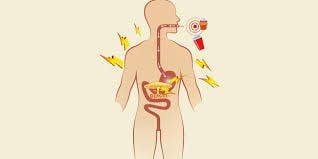This is an automatically translated article.
Maintaining the body's metabolism at a high level is very important to lose weight and stay in shape. However, some common lifestyle mistakes can slow down your metabolism. If they happen frequently, these habits can make it difficult to lose weight — and even make you more likely to gain weight in the future.
1. Add too few calories
Adding too few calories can slow down your metabolism. While a calorie deficit is necessary for weight loss, it can backfire causing your calorie intake to drop too low. When you dramatically reduce your calorie intake, your body senses that food is scarce and slows down the rate at which it burns calories.
Controlled studies in lean and overweight individuals confirm that consuming less than 1,000 calories per day can have a significant impact on metabolic rate. Most studies measure resting metabolic rate, which is the number of calories burned at rest. However, some also measure calories burned during 24-hour periods of rest and activity, known as total daily energy expenditure.
In one study, when obese women added 420 calories per day for 4-6 months, their resting metabolic rate slowed down significantly. Furthermore, even after they increased their calorie intake for the following five weeks, their resting metabolic rate was still much lower than it was before the diet.
In another study, overweight people were asked to consume 890 calories per day. After 3 months, their total calorie intake decreased by an average of 633 calories.
Even with more moderate calorie restriction, it can still slow down your metabolism. In a 4-day study in 32 people, the resting metabolic rate of those who ate 1,114 calories per day was more than twice as slow as those who consumed 1,462 calories. However, the weight loss was similar for both groups.
If you intend to lose weight by restricting calories, do not restrict your calories too much or for too long.
In short, cutting calories too much and for too long will lower your body's metabolic rate, which can make weight loss and weight maintenance more difficult.

Bổ sung quá ít calo làm chậm quá trình trao đổi chất
2. Skip the protein
Eating enough protein is extremely important to achieve and maintain a healthy weight. In addition to helping the body feel full, high protein intake can significantly increase the body's rate at which calories are burned.
The increase in metabolism that occurs after digestion is called the thermic effect of food (TEF). The thermic effect of protein is much higher than that of carbs or fats. Indeed, studies show that eating protein increases metabolism by about 20-30% compared to 5–10% for carbs and 3% or less for fat.
While metabolic rate inevitably slows down during weight loss and continues to slow down during steady weight maintenance, evidence suggests that higher protein intake can mitigate this effect .
In one study, participants followed one of three diets in an attempt to maintain a 10-15% weight loss.
The high-protein diet reduced total daily energy expenditure by 97 calories, compared with 297–423 calories in people who consumed less protein.
Another study found that people need to eat at least 0.5 grams of protein per pound of body weight (1.2 grams per kilogram) to prevent their metabolism from slowing down during and after weight loss .
In short, protein increases metabolic rate more than carbs or fat. Increasing the amount of protein in the diet helps maintain metabolic rate during weight loss and maintenance.
3. Maintain a sedentary lifestyle
Sedentary habits can lead to a significant reduction in calories burned each day. More notably, many people lead a lifestyle that primarily involves sitting at work, which can have a negative impact on metabolic rate and overall health.
While exercising or playing sports can have a big impact on calories burned, even basic physical activities, such as standing, cleaning, and taking the stairs, can help. you burn calories. This type of activity is called non-exercise activity thermogenesis (NEAT).
One study found that a high intake of NEAT can burn an extra 2,000 calories per day. However, such dramatic increases are impractical for most people.
Another study noted that watching TV while sitting burned an average of 8% fewer calories than typing while sitting - and 16% fewer calories than while standing. Working from a standing desk or simply getting up and commuting a few times per day can help boost NEAT and prevent your metabolism from dropping.
In short, a sedentary lifestyle reduces the number of calories you burn during the day. Try to minimize sitting and increase activity levels throughout the day.

Lối sống ít hoạt động làm giảm số lượng calo
4. Not getting enough sleep
Sleep is extremely important for good health. Getting less sleep can increase your risk of several diseases, including cardiovascular disease, diabetes, and depression.
Some studies note that not getting enough sleep can also decrease the body's metabolic rate and increase the likelihood of weight gain. One study found that healthy adults who slept 4 hours per night for 5 consecutive nights had an average 2.6% decrease in resting metabolic rate. Their metabolic rate returned to normal after 12 hours of uninterrupted sleep.
Sleep deprivation gets worse when you sleep during the day instead of sleeping at night. This type of sleep disrupts the body's circadian rhythms. One 5-week study found that prolonged sleep restriction combined with disruption of circadian rhythms reduced resting metabolic rate by an average of 8%.
In short, getting enough, high-quality sleep and sleeping at night instead of during the day can help maintain the body's metabolic rate.
5. Drink sugary drinks
Sugary drinks are detrimental to overall health. Consuming a variety of sugar-sweetened beverages has been linked to an increased risk of various diseases, including insulin resistance, diabetes, and obesity.
Many of the negative effects of sugary drinks can be attributed to fructose. Table sugar contains 50% fructose, while high-fructose corn syrup contains 55% fructose.
Regular consumption of sugary drinks can slow down the body's metabolism. In a 12-week controlled study, overweight and obese individuals who consumed 25% of their calories as fructose-sweetened beverages on a weight-maintenance diet had significantly reduced metabolic rates. metabolism.
On the other hand, not all studies support this idea. One study noted that eating too much high-fructose corn syrup compared to whole wheat had no effect on 24-hour metabolic rate. However, research shows that consuming too much fructose promotes fat storage in the abdomen and liver.
6. Lack of endurance training
Exercising with weights is a great strategy to keep your metabolism from slowing down. Strength training has been shown to increase metabolic rate in healthy individuals, as well as those with heart disease or who are overweight or obese. It increases muscle mass, making up most of the fat-free mass in the body. This significantly increases the number of calories burned at rest.
Even minimal strength exercises can increase energy expenditure. In a 6-month study, people who did strength training for 11 minutes a day, 3 days a week, had a 7.4% increase in resting metabolic rate and burned an average of 125 more calories per day.
On the contrary, not strength training can cause your metabolic rate to drop, especially during weight loss and aging.
In short, strength training increases muscle mass and helps maintain the body's metabolic rate during weight loss and aging.
In general, engaging in lifestyle behaviors that slow down your metabolism can lead to weight gain over time. It is best to avoid or minimize them as much as possible. That said, many simple activities can boost your body's metabolism to help you lose weight effectively and long term.
Please dial HOTLINE for more information or register for an appointment HERE. Download MyVinmec app to make appointments faster and to manage your bookings easily.
Reference source: healthline.com













